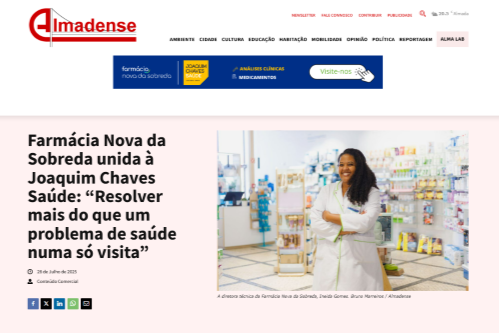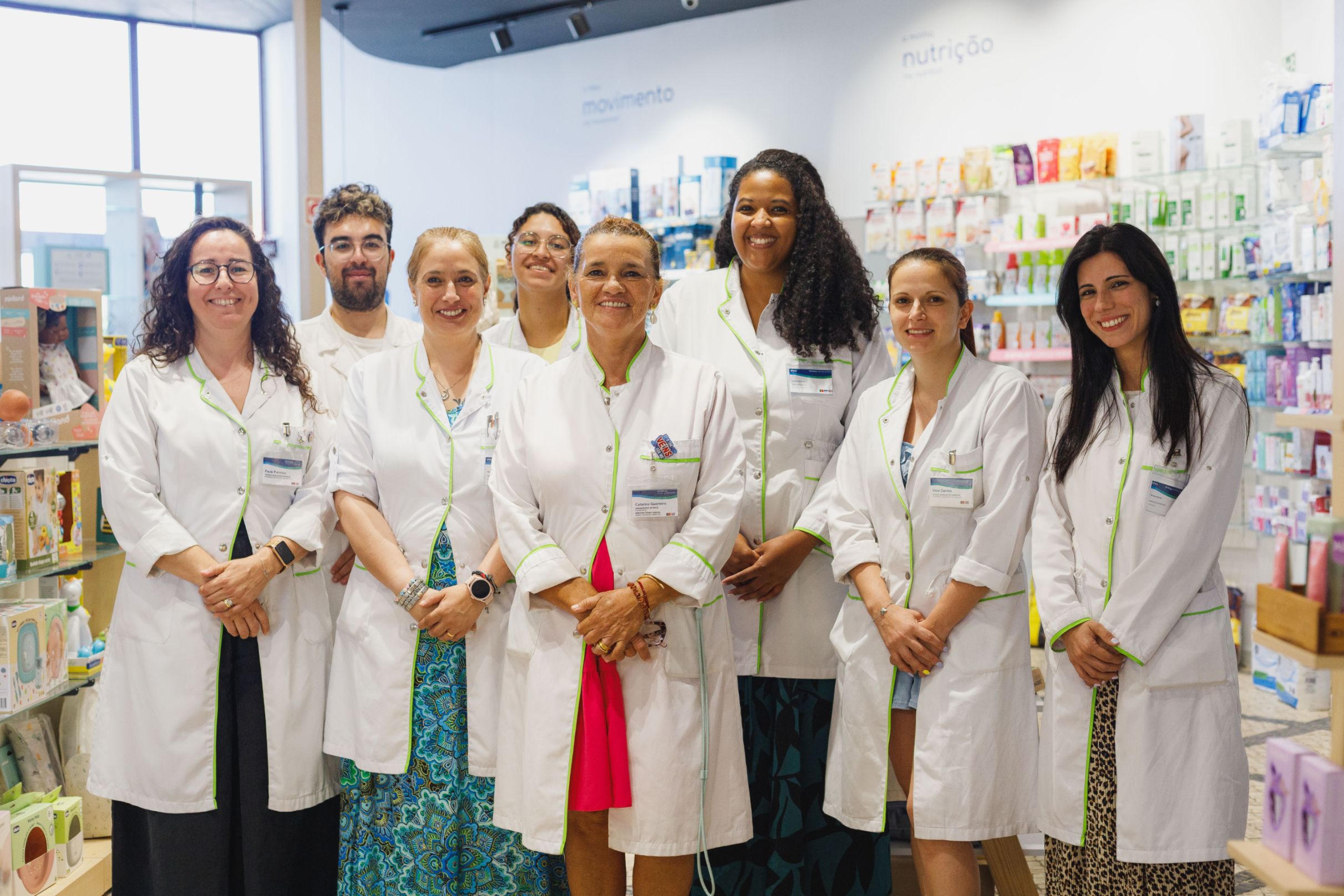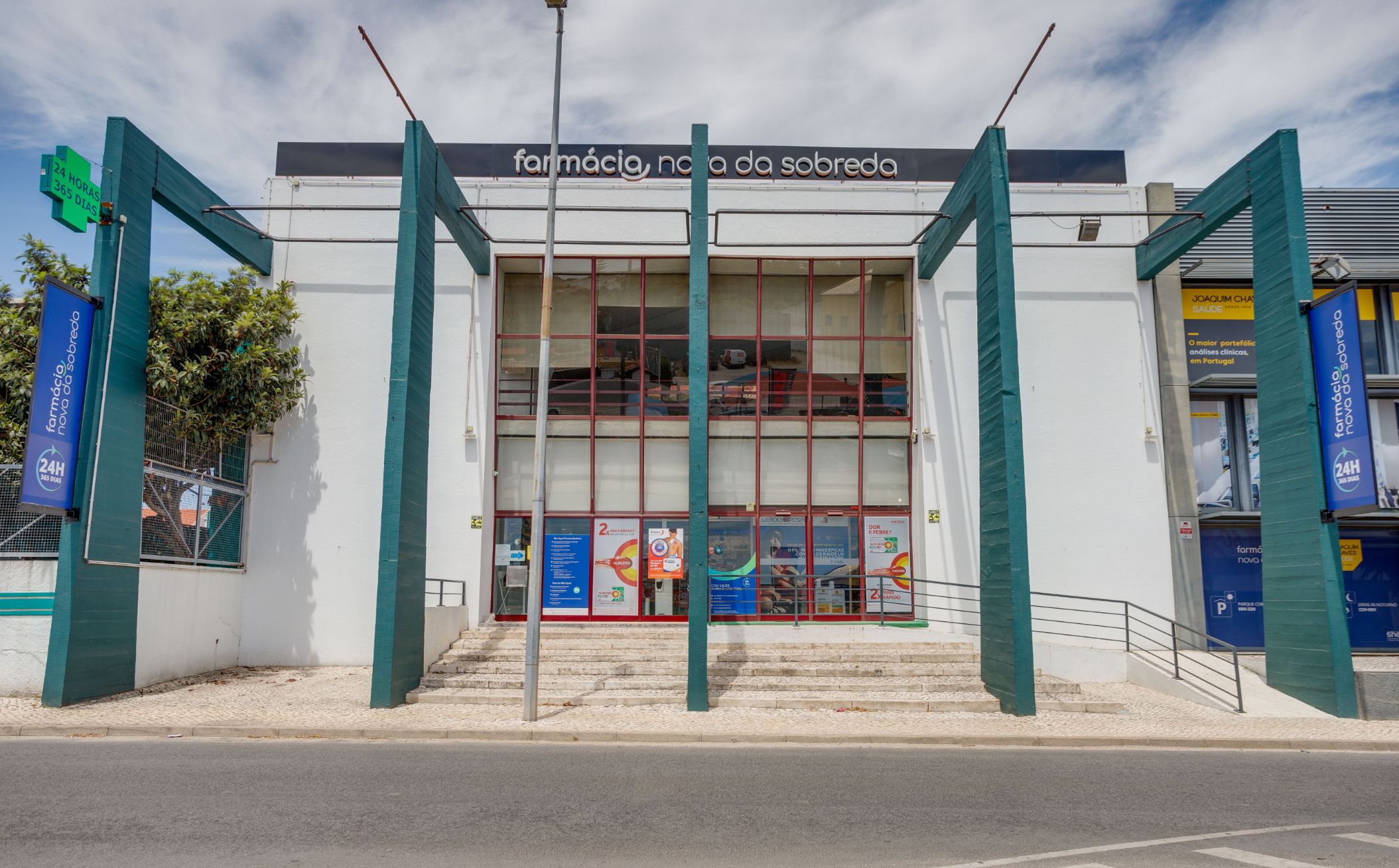
Farmácia Nova da Sobreda recently adopted an innovative model with new opening hours 24 hours a day, 365 days a year. What motivated this commitment?
We are a health service and, as such, we believe it is essential to be available 24 hours a day in order to serve our population.
The extension of opening hours reinforces the availability of pharmaceutical services on the south bank of the River Tagus, based on the quality of our team, the convenience of our space and the breadth of our portfolio of products and services, which includes the Joaquim Chaves Saúde clinical analysis unit. And also our strategic location in the industrial area of Sobreda, close to the Vale Figueira road, in Quinta do Gato Bravo. It turns out to be a project that was needed in this area.
What has been the public's reaction to the extended opening hours?
Take-up has been very positive, reinforcing the importance of this decision. We are a comprehensive health space and we all know that the need for a pharmaceutical service, a medicine or a health product can arise when you least expect it.
Another situation that needs to be mentioned has to do with the increase in requests for home delivery via the platforms - for the time being on Glovo and soon also on Uber Eats - precisely because we have longer opening hours. These requests are related to very important needs for people who can't afford to leave the house. Imagine a mother with a small sick child who needs an antibiotic that has run out and can't leave the child at home alone at night.
Is delivery via platforms also available 24 hours a day?
Yes, it works all night.
How did the idea of creating an indoor night drive-in come about?
The idea of having a drive-in is related to comfort, convenience and safety, not only for our customers, but also for the team. People feel much safer, less exposed.
This way, during the night, we can take advantage of the covered park that serves both health services during the day - pharmacy and clinical analysis - for a more personalized and closer service.

How did the partnership with Joaquim Chaves Saúde come about?
Our aim is to be able to solve more than one health problem in a single trip to the pharmacy.
Joaquim Chaves Saúde is a benchmark in healthcare in Portugal, given the range of services it provides: clinical analysis, consultations, exams and treatments, including surgery. For us, it was the natural partner because it allows us to extend the provision of quality and safe health services at a time when access and response is becoming increasingly difficult, especially in the Lisbon and Tagus Valley region.
What shared vision unites these two entities and how does it materialize on a daily basis?
We believe that a multidisciplinary team made up of doctors, pharmacists, nurses and health technicians who work together, in a complementary way, so that all users have access to quality health care in a differentiated way.
At the moment there is a gap in the health response to each of us and our families. With this solution we have a team in one place that knows our health and can not only help us take care of our chronic illnesses, but also acute situations.
We want to have a team here that is always available to accompany and advise, keeping up with technological innovation, so that our teams have all the means to focus more and more on prevention.
What is the importance of having a clinical analysis unit integrated into the pharmacy and what are the opening hours for this area?
It is the most visible aspect of this partnership and has proved to be a winning bet. Our customers value the possibility of dealing with more than one health issue when they come to our pharmacies and solving their needs more conveniently in one place. In this way, the user can have the support of several health professionals in a single visit.
At the moment, the clinic is open from 8 a.m. to 12 p.m. and there is no need to make an appointment. Users can come with their prescription and will be seen on a first-come, first-served basis.

How do clinical analysis services interact with pharmaceutical services?
The teams work together, always with the patient's consent. In this way, we can alert the team accompanying the patient to certain situations. For example, if a diabetic patient is found to have uncontrolled cholesterol levels after tests, this is where the team's role is crucial, as it alerts them to the need to correct their therapy. In this way, we can detect gaps and alert them.
What impact does this have on the continuity of care provided to the population?
We are still at an early stage and believe that much more can be done. But we have already noticed small improvements, understanding what works best when advising and dispensing medicines. This is very important for our work and for improving the health of our clients.
How would you describe the relationship between the pharmacy and the users, especially the elderly?
Elderly users sometimes find pharmacists the most accessible health professionals. In addition to selling drugs, our multidisciplinary team of health professionals provides information to users and their carers and monitors the use of medication in order to promote adherence to it, bridging the gap between doctors and other health professionals.

Are there any other services that you think are important to highlight, especially because of the impact they have had on the senior population?
To date, we have a number of patients who use the Individualized Medication Preparation (IMP) service. Non-adherence to therapy can lead to negative results for the user and the implementation of this service is a useful method for managing and adhering to therapy, especially in the elderly and/or polymedicated population.
Our team of health professionals plays an important role in adherence to therapy, thanks to their privileged position of proximity to users.
Finally, the support given to caregivers has been fundamental through our ability to teach them how to best manage the elderly patient's medication, to help increase health literacy and to provide information about the services available at health institutions in the Almadense community.
What plans do you have for the future of the pharmacy and the services it offers?
We intend to consolidate this first phase and take advantage of our space to extend to other health services, as part of the partnership with Joaquim Chaves. We still have space in the pharmacy that we can use to work on more services that we can offer users. The important thing is to continue serving health with excellence.
Source: Jornal Almadense